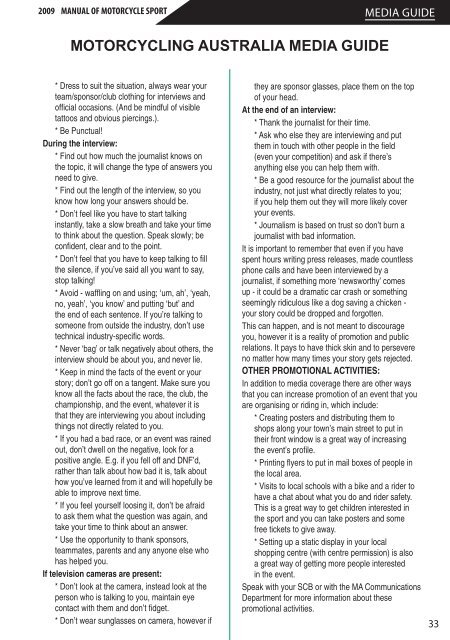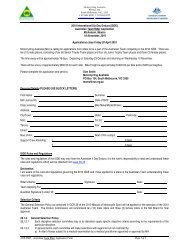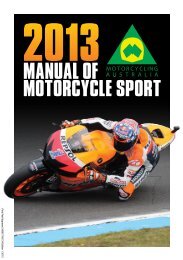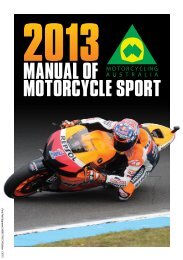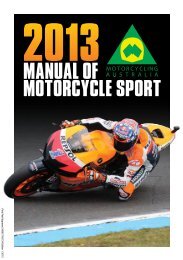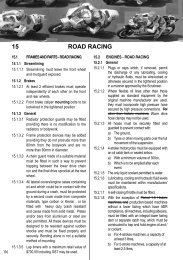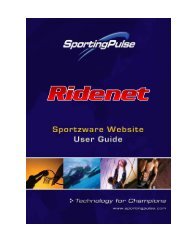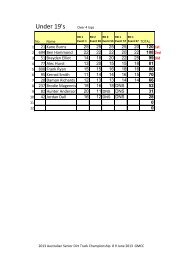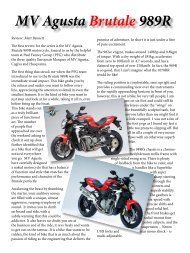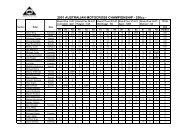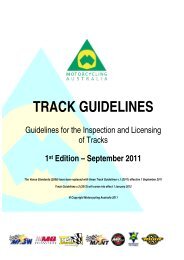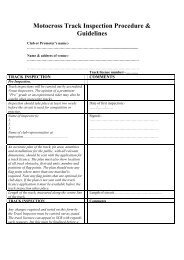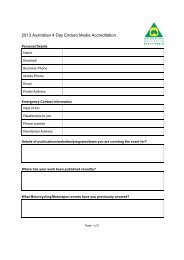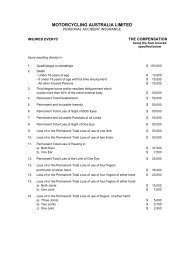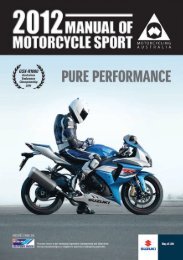2009 Manual of Motorcycle Sport - Motorcycling Australia
2009 Manual of Motorcycle Sport - Motorcycling Australia
2009 Manual of Motorcycle Sport - Motorcycling Australia
- No tags were found...
Create successful ePaper yourself
Turn your PDF publications into a flip-book with our unique Google optimized e-Paper software.
<strong>2009</strong> MANUAL OF MOTORCYCLE SPORTMEDIA GUIDEMOTORCYCLING AUSTRALIA MEDIA GUIDE* Dress to suit the situation, always wear yourteam/sponsor/club clothing for interviews and<strong>of</strong>fi cial occasions. (And be mindful <strong>of</strong> visibletattoos and obvious piercings.).* Be Punctual!During the interview:* Find out how much the journalist knows onthe topic, it will change the type <strong>of</strong> answers youneed to give.* Find out the length <strong>of</strong> the interview, so youknow how long your answers should be.* Don’t feel like you have to start talkinginstantly, take a slow breath and take your timeto think about the question. Speak slowly; beconfi dent, clear and to the point.* Don’t feel that you have to keep talking to fi llthe silence, if you’ve said all you want to say,stop talking!* Avoid - waffl ing on and using; ‘um, ah’, ‘yeah,no, yeah’, ‘you know’ and putting ‘but’ andthe end <strong>of</strong> each sentence. If you’re talking tosomeone from outside the industry, don’t usetechnical industry-specifi c words.* Never ‘bag’ or talk negatively about others, theinterview should be about you, and never lie.* Keep in mind the facts <strong>of</strong> the event or yourstory; don’t go <strong>of</strong>f on a tangent. Make sure youknow all the facts about the race, the club, thechampionship, and the event, whatever it isthat they are interviewing you about includingthings not directly related to you.* If you had a bad race, or an event was rainedout, don’t dwell on the negative, look for apositive angle. E.g. if you fell <strong>of</strong>f and DNF’d,rather than talk about how bad it is, talk abouthow you’ve learned from it and will hopefully beable to improve next time.* If you feel yourself loosing it, don’t be afraidto ask them what the question was again, andtake your time to think about an answer.* Use the opportunity to thank sponsors,teammates, parents and any anyone else whohas helped you.If television cameras are present:* Don’t look at the camera, instead look at theperson who is talking to you, maintain eyecontact with them and don’t fi dget.* Don’t wear sunglasses on camera, however ifthey are sponsor glasses, place them on the top<strong>of</strong> your head.At the end <strong>of</strong> an interview:* Thank the journalist for their time.* Ask who else they are interviewing and putthem in touch with other people in the fi eld(even your competition) and ask if there’sanything else you can help them with.* Be a good resource for the journalist about theindustry, not just what directly relates to you;if you help them out they will more likely coveryour events.* Journalism is based on trust so don’t burn ajournalist with bad information.It is important to remember that even if you havespent hours writing press releases, made countlessphone calls and have been interviewed by ajournalist, if something more ‘newsworthy’ comesup - it could be a dramatic car crash or somethingseemingly ridiculous like a dog saving a chicken -your story could be dropped and forgotten.This can happen, and is not meant to discourageyou, however it is a reality <strong>of</strong> promotion and publicrelations. It pays to have thick skin and to persevereno matter how many times your story gets rejected.OTHER PROMOTIONAL ACTIVITIES:In addition to media coverage there are other waysthat you can increase promotion <strong>of</strong> an event that youare organising or riding in, which include:* Creating posters and distributing them toshops along your town’s main street to put intheir front window is a great way <strong>of</strong> increasingthe event’s pr<strong>of</strong>i le.* Printing fl yers to put in mail boxes <strong>of</strong> people inthe local area.* Visits to local schools with a bike and a rider tohave a chat about what you do and rider safety.This is a great way to get children interested inthe sport and you can take posters and somefree tickets to give away.* Setting up a static display in your localshopping centre (with centre permission) is alsoa great way <strong>of</strong> getting more people interestedin the event.Speak with your SCB or with the MA CommunicationsDepartment for more information about thesepromotional activities.33


